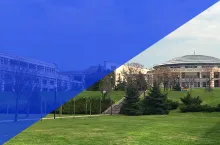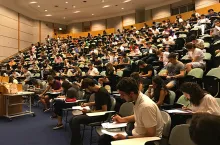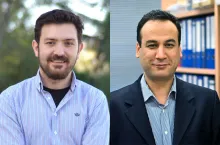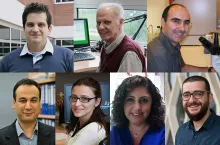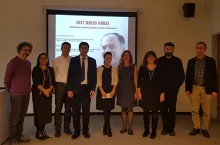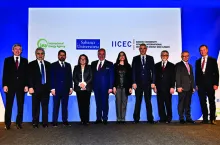The best time for energy importers
The Sabancı University Istanbul International Center for Energy and Climate (IICEC) hosted the Turkish launch event of the World Energy Outlook 2017 report. International Energy Agency Executive Director Dr. Fatih Birol presented the World Energy Outlook 2017 report at the meeting. Dr. Fatih Birol argued that this was the best time for energy-importing countries, saying "The number of importers was 5 in 2000, but will become 51 by 2020. Russia will continue to export. US, Canada and Australia are entering the market as new exporters. It will be a grave mistake if energy importers miss this opportunity."

The Sabancı University Istanbul International Center for Energy and Climate (IICEC) hosted the Turkish launch event of the World Energy Outlook 2017 report on Friday, December 15, 2017. The report was presented by International Energy Agency Executive Director Dr. Fatih Birol.
Hosted by Sabancı University Founding Board of Trustees Chair Güler Sabancı and Sabancı University IICEC Director Professor Carmine Difiglio, the meeting was also attended by the Director of the Parliamentary Commission on Industry, Trade, Energy, Natural Resources, Information and Technology Ziya Altunyaldız and TÜSİAD Director Erol Bilecik as speakers.
IICEC Honorary Chairman and International Energy Agency (IEA) Director Dr. Fatih Birol stated that this was the best time for energy-importing countries, continuing, “US, Canada and Australia are entering the market as new exporters. Russia will continue to export. This is a great time for energy importers. It will be a grave mistake if energy importers miss this opportunity. The number of importers was 5 in 2000, but will become 51 by 2020." Also discussing climate change, Dr. Fatih Birol said that the world was a great distance away from meeting the Paris Climate Convention targets. Summarizing what needed to be done, Birol said, "We must make the world twice as energy efficient. Our primary fuel is energy efficiency."

Speaking in the launch event, Sabancı University IICEC Director Professor Carmine Difiglio expressed IICEC's pleasure to host the fifth World Energy Outlook launch event. Saying that IICEC was a research center that merged thought with analyses and business dynamics, Prof. Difiglio continued, “Unless backed with sustainable action by the industry, research and government policies cannot produce solid outputs. Being at the center of the triangle formed by the public sector, businesses and academia, IICEC is in a perfect position to conduct analyses and issue research publications, inform the energy market on a regular basis, and expand its network of experts.”
We need a long-term and resilient balance to energy supply and demand.
TÜSİAD Director Erol Bilecik discussed the strategic importance of energy investments for the sustainability of development, continuing "We are among the regions that will be affected the worst by climate change as a global issue. We are almost 75% dependent on imports for energy. We have a great opportunity to reduce this dependence: Our potential in wind, solar and other renewables is rich and varied. We must make maximum use of this potential.”
Saying that the security of energy supply was among the key parameters of development, Erol Bilecik continued: “This is a requirement for Turkey's social development and economic growth targets. We need a long-term and resilient balance to energy supply and demand. The first step towards this is establishing a transparent, predictable and more competitive market. Another priority is making inroads in energy efficiency as quickly as possible. We believe that, as the public and private sectors, we need to establish an ecosystem that will ensure the maximum utilization of our renewable energy sources. To this purpose, a regulatory framework that will incentivize investments and a grid infrastructure that will enable the most effective implementation are critical components."
Also speaking at the launch event, Director of the Parliamentary Commission on Industry, Trade, Energy, Natural Resources, Information and Technology Ziya Altunyaldız said, “Turkey has been growing, and energy demand has been going up by 5% year after year. Renewable energies are Turkey's advantage, and the energy sector, where private players are the driving force, has growth predictions from generation to distribution. We took important steps towards liberalization in electricity. We are trying to do the same in natural gas. Renewable energies are our lifeblood."
The United States is stepping up to world leadership in shale oil and gas
Discussing the rapid change in the US, Chinese and Indian markets, IICEC Honorary Chairman and International Energy Agency (IEA) Executive Director Dr. Fatih Birol said that the change in China would once again have an impact on global energy markets, continuing, "China is taking great strides in nuclear energy. It will reduce costs, and become an exporter of nuclear technology." Fatih Birol also said that the developments in the US energy sector would affect everyone deeply:
"In spite of declining oil prices, the US will continue to be the world's largest shale oil and gas producer. The ability to exploit new resources at low costs elevates oil and gas production in the US to a level that is inaccesible by most other countries. The US was already a net exporter of gas, and will become a net exporter of oil by the end of 2020."

Dr. Fatih Birol shared the following findings of World Energy Outlook 2017:
"The report describes new ways for global energy. The need for energy will continue to increase, albeit at a lower rate, and will be 30% greater in 2040 than what it is now. To meet rising demand, China needs to add the equivalent of today’s United States' power system to its electricity infrastructure by 2040, and India needs to add a power system the size of today’s European Union. The technologies used by China and India will reduce costs. The ways in which the world meets its growing energy need are fundamentally different from what they had been 25 years ago. At the top is natural gas, followed by the rise of renewable energies and energy efficiency. Renewable resources meet 40% of the increase in base demand, and the boom in renewable energies signals the end of coal's golden age. This is mostly due to power plants under construction. The share of coal in India's energy resources will decline below 50% by 2040. The use of gas will reach 45% by 2040, and it will grow mostly in the industrial sector as its use in electricity generation is losing momentum. China is leading the increase in nuclear energy. By 2030, China will surpass the US as the largest nuclear energy producer of the world."
Electricity will account for 40% of end use
Electricity is growing faster than energy. Global demand for electricity will rise by more than 60% in the near future. Electricity will attract more investment than oil and gas. Electricity will account for 40% of end use by 2040, and this is equal to the growth of oil over the last 25 years. One-third of the growth in electricity is owed to industrial electrical engines. Rising incomes mean that many millions of households add electrical appliances (with an increasing share of “smart” connected devices) and install cooling systems. The world also gains, on average, 45 million new electricity consumers each year due to expanding access to electricity, although this is still not enough to reach the goal of universal access by 2030.
Toplantının açılışında konuşan Sabancı Üniversitesi IICEC Direktörü Prof. Carmine Difiglio, IICEC olarak bu yıl Dünya Enerji Görünümü Raporu sunumuna 5’inci kez ev sahipliği yapmaktan dolayı çok mutlu olduklarını belirtti. IICEC’in düşünce, analiz ve iş dünyası dinamiklerini birleştiren bir araştırma merkezi olduğunu söyleyen Prof. Difiglio, “Araştırmalar ve devlet politikaları, sektörün sürdürülebilir aksiyonlarıyla desteklenmediği sürece kesin çıktılar üretemez. IICEC; kamu, iş dünyası ve akademi üçgeninin merkezinde olduğu için, analiz yaparak yeni araştırma yayınları ortaya çıkarıyor, enerji pazarına düzenli bilgilendirme yapıyor ve uzman ağını genişletiyor.”



